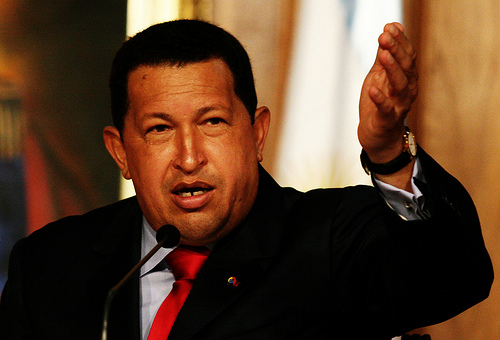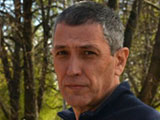Life Beyond Chávez
by Israel Centeno and translated by Kelly V. Harrison / August 13, 2013 / No comments
Who really exercises power in Venezuela now?

Hugo Chávez. Photo: Bernardo Londoy via Flickr.
Hugo Chávez came to power in 1998 and immediately put his political plan into action: Attacking every institution, breaking them up and having them at his beck and call. He called a Constitutional Assembly to draw up a new Constitution. This process was the pretext for dissolving public authorities and blurring the line between his own wishes and those of the Supreme Court, the Public Prosecutor’s Office, the electoral arbitrator, and the Assembly.

- From his lonely watch post Albert Camus asked who among us has not experienced exile yet still managed to preserve a spark of fire in their soul. “We’re all alone,” Natalia Sedova cried in exile on hearing of her husband Leon Trotsky’s affair with Frida Kahlo. In his novel Night Watch, Stephen Koch follows the incestuous love affair of David and Harriet, wealthy siblings watching the world from their solitary exile. Koch’s writing, Camus’s theories, and Trotsky’s affair all come back to exile and lead me to reflect on the human condition. From my own vantage point, my Night Watch, I will reflect on my questions of exile, writing, and the human condition.

- Israel Centeno was born in 1958 in Caracas, Venezuela, and currently lives in Pittsburgh as a Writer-in-Residence with City of Asylum/Pittsburgh. He writes both novels and short stories, and also works as an editor and professor of literature. He has published nine books in Venezuela and three in Spain.
He maintained democratic appearances, but he manipulated the new Constitution, and he introduced rules that would end up changing everything that had previously established Venezuela as a democracy. He polarized the country, converting the elections to a referendum in which the voters always had to choose between him and another nominee. He put himself in charge of interpreting the written Constitution, which he amended countless times during his office. He directly controlled the oil companies and the central bank, he became the lord of bureaucracy, intervening in food production and distribution, and he imposed strict control of currency exchanges. What his followers called “the finger of Chávez” was not a metaphor; he had the power to appoint and dismiss judges, to create offences not covered by law when he lost an election, and to condemn people with only his opinion, sentencing them to years of prison or exile.
Socialism stopped being an ideology and took on a new meaning: Everything the military leader wanted. He debilitated private enterprise and pushed the media and the independent journalists aside until he had imposed his hegemony. Venezuelans once more came to see the government as an authoritative entity: Omnipotent, the great provider and the great punisher.
After Chávez’s death, one might wonder whether all that power was actually conferred upon his successor, Nicolás Maduro. The answer is no. In fact, Chávez has been transformed into a religious driving force. Around the absent leader, attempts are being made to reconcile different interests in order to maintain the monstrous, populist and corrupt capitalism of the State, the only true legacy of the Comandante’s revolutionary process.
Given the lack of institutionalism, we have to wonder who really exercises power in Venezuela.
As mentioned before, there is no division of power and the National Assembly seems to have been hijacked by gangsters. The governing party is a motionless mass full of contradictions. Many analysts have hailed Diosdado Cabello, president of the Assembly, as the power behind the power; others have cited the president of the PDVSA, Rafael Ramírez, or the Castros in Cuba. The truth is that Chávez, the man capable of covering up any cracks and hiding the structure of power, is no more, and yet here we are seeing his wishes in action: The corrupt capitalism of the State, only ever mentioned in the never-ending referendum (the key to success) between Him and the other guy. Nevertheless, an important and traditional factor keeps the balance: The army.




